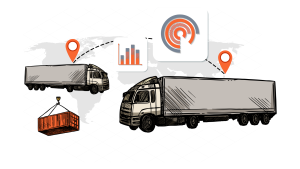In the fast-expanding maritime industry, digitalization has come to serve as a driving force behind effectiveness, security, and connectivity. Maritime satellite communication, a technology that has changed how ships communicate, exchange data, and operate in distant sections of the world’s oceans, is at the heart of this transformation.
This blog examines satellite communication’s vital role in allowing digitalization in the maritime industry by highlighting its benefits.
Foundation of Maritime Communication
It is critical to understand the foundation of maritime communication systems before digging into the impact of satellite communication services on digitalization. In the past, ships relied on radio frequency-based communication techniques that had limited coverage and capability. However, with the introduction of satellite communication, the maritime connectivity paradigm shifted.
Satellite communication solutions serve as a bridge, linking vessels to onshore networks, enabling seamless communication, and simplifying the transmission of real-time information This system uses a network of geostationary and low-Earth orbit satellites (LEO) to provide global coverage, eliminating geographical limits and enabling reliable communication even in the most remote corners of the world’s oceans.
Necessity for Digitalization in the Maritime Industry
The maritime industry’s shift to digitalization and automation is accelerating. Artificial intelligence (AI), big data analytics (BDA), cloud computing, and the Internet of Things (IoT) are already influencing the sector, projecting a new operational paradigm and bringing new types of vessels, such as smart ships and autonomous ships. Digital technologies and solutions have been implemented to improve operating efficiency, boost competitiveness, and foster collaboration among crew and officers ashore. Furthermore, they are being adopted to move the industry toward decarbonization in order to create a more sustainable ecology. This new era of maritime digitization will not be possible without fast and dependable internet connectivity.
The Impact of Digitalization on the Marine Industry
The integration of sophisticated technology, data analytics, and automation to improve operations and decision-making processes in the maritime industry is referred to as digitalization. This transition provides various benefits, including increased safety, efficiency, cost savings, and sustainability.
Satellite Communication as an Essential Accelerator of Digitalization
Satellite communication is an essential booster of digitalization in the maritime industry, serving as the foundation for connectivity, data exchange, and remote monitoring. It has various advantages over traditional communication techniques, which makes it essential for digital transformation.
Global Coverage That Is Constant
Unlike terrestrial communication infrastructure, satellite communication provides worldwide coverage, enabling ships to stay connected regardless of their location. This constant connectivity provides real-time communication and data sharing between vessels with data transfer apps for the marine industry, onshore facilities, and maritime authorities.
Provides High Bandwidth and Data Rates
Satellite communication systems offer high-speed data transmission, allowing massive amounts of data to be transferred in real time. This functionality is critical for video conferencing, remote diagnostics, and sharing high-resolution photos or video footage.
Ensures Reliability and Consistency
Maritime satellite communication systems are built to be extremely reliable, ensuring constant connectivity even under poor weather conditions or during natural disasters. Furthermore, multiple satellite networks provide backup choices, reducing the likelihood of communication failures and downtime.
Offering a Broad Range of Communication Services
Satellite communication provides a full array of services customized to the specific needs of the maritime industry. Voice communication, broadband internet access, email services, remote monitoring, and asset monitoring are examples of these services.
Massive Cost Savings
Digitalization has played a role in the transition from paper-based documentation to digital formats, requiring less physical storage space and printing costs. The speed and quality of electronic documentation reduce the likelihood of errors and delays.
Improved Customer Experience
As a result of marine digitalization, shipping companies can now give customers real-time updates on the condition of their cargo, including the ship’s location, projected time of arrival, and even any postponements or schedule changes. Customers are able to monitor their shipments from anywhere using cellphones or other devices, enhancing transparency and decreasing uncertainty.
Challenges and Prospects for the Future
While satellite communication has transformed maritime digitization and communications, a number of issues still remain. These include the cost of installing and operating satellite communication systems, the requirement for experienced staff to manage and operate the equipment, and assuring cybersecurity in a more linked maritime ecosystem.
In the maritime industry, the future of satellite communication services contains exciting advances. Emerging trends such as high-throughput satellite deployment, 5G network integration, and the use of advanced data analytics and AI will improve connection, efficiency, and safety in maritime operations.
Conclusion
In the maritime industry, satellite communication has emerged as a critical accelerator of digitalization. Satellite communication enables stakeholders to embrace digital transformation and reap its huge benefits by delivering consistent global coverage, high bandwidth, reliability, and a diverse range of services.
IEC Telecom serves as a top supplier of cutting-edge maritime satellite communication services in the industry. With several years of experience and an established track record, IEC Telecom offers a wide range of products and services designed exclusively to suit the communication needs of marine professionals.





